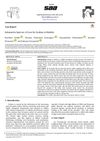
Search
for
Sort by
Research
30-60 / 1000+ results

research Phase-Specific Differential Regulation of Mechanical Allodynia in a Murine Model of Neuropathic Pain by Progesterone
Progesterone initially worsens but later reduces neuropathic pain in mice, through different mechanisms.

research Generalized Demodicosis and Malasseziosis in a Pug Mix Dog
The dog's skin condition improved significantly after seven days of treatment.

research Androgens’ Effects Across the Lifespan in Men and Animal Models
Androgens, male hormones, affect physical and mental functions, with a decrease leading to health issues like muscle loss, bone disease, and depression, and more research is needed on long-term effects and treatments.
research Alleviation of Mechanical Allodynia by 14,15-Epoxyeicosatrienoic Acid in a Central Poststroke Pain Model: Possible Role of Allopregnanolone and Delta-Subunit-Containing Gamma-Aminobutyric Acid A Receptors
14,15-EET may help reduce poststroke pain by affecting certain brain proteins.
research Enzymes
Enzymes are classified into six types and are essential for many biological processes, with only a few targeted by drugs.
research Pharmacotherapy for Keloids and Hypertrophic Scars
Combination pharmacotherapy is generally more effective for treating keloids and hypertrophic scars.

research Post-Finasteride Syndrome and Post-SSRI Sexual Dysfunction: Two Clinically Similar Conditions
Some people experience lasting sexual, psychological, and sleep problems after using finasteride or SSRI antidepressants, possibly due to similar underlying causes.
research Analysis of Adverse Drug Reactions in Pediatric Patients with Epilepsy: An Intensive Pharmacovigilance Study
Many pediatric epilepsy patients experience preventable severe adverse drug reactions, especially with certain medications and risk factors.

research Plant Cell Culture as Emerging Technology for Production of Active Cosmetic Ingredients
Plant cell culture is a promising method for creating sustainable and high-quality cosmetic ingredients.

research Sexual Dimorphism Following In Vitro Ischemia in the Response to Neurosteroids and Mechanisms of Injury
Male tissue has more cell death than female tissue after ischemia, and some neurosteroids only protect female cells.

research Gut Microbiome, Metabolome and Alopecia Areata
The health of the gut may be important in developing new ways to prevent, diagnose, and treat alopecia areata.

research Abstracts
The document reports findings on genetic research, including ethical concerns about genome editing, improved diagnosis of mitochondrial mutations, solving inherited eye diseases, confirming gene roles in epilepsy, linking a gene to aneurysms, and identifying genes associated with age-related macular degeneration.

research Pathophysiological Mechanisms Implicated in Postpartum Depression
Postpartum depression is linked to changes in brain chemicals, inflammation, stress, and certain genes, and can potentially be identified by markers like specific steroids, serotonin levels, and vitamin D levels.

research Fluoroquinolone-Induced Serious, Persistent, Multisymptom Adverse Effects
Some people experience severe, long-lasting side effects from fluoroquinolone antibiotics, leading to the recommendation of limited use and increased awareness of these risks.
research Overexpression of the 18 kDa Translocator Protein (TSPO) in the Hippocampal Dentate Gyrus Produced Anxiolytic and Antidepressant-Like Behavioral Effects
Increasing TSPO in the brain reduces anxiety and depression.

research Microglia: Sculptors of the Polycystic Ovary Syndrome-Like Brain?
Microglia, the brain's immune cells, may contribute to Polycystic Ovary Syndrome (PCOS) by altering the female brain's structure and function, with kisspeptin neurons and GABA neurotransmitters also playing a role.

research Effect of Flutamide and Two Novel Synthetic Steroids on GABA, Glutamine, and Some Oxidative Stress Markers in Rat Brain and Prostate
Flutamide and a new synthetic steroid affected brain and prostate chemicals and showed potential for treating androgen-related conditions and epilepsy.

research Joint Public Review: Touch Receptor End-Organ Innervation and Function Require Sensory Neuron Expression of the Transcription Factor Meis2
Meis2 is essential for touch sensation and nerve function in mice.

research Steroid Sulfatase Inhibitors: Therapeutic Applications and Development
Steroid Sulfatase inhibitors show promise in treating hormone-dependent disorders like cancers, hair loss, and acne, with 667COUMATE being a potential candidate for breast cancer treatment trials.

research Author Response: Touch Receptor End-Organ Innervation and Function Require Sensory Neuron Expression of the Transcription Factor Meis2
The transcription factor Meis2 is essential for touch sensation and proper nerve development in touch receptors.
research Sodium Valproate Improves Skin Flap Survival via Gamma-Aminobutyric Acid and Histone Deacetylase Inhibitory System
Sodium valproate helps skin healing by affecting GABA and histone deacetylase.

research Selamectin Spot-On: A Cure for Scabies in Rabbits
Selamectin spot-on effectively treats scabies in rabbits.

research Divergent Neuroactive Steroid Responses to Stress and Ethanol in Rat and Mouse Strains: Relevance for Human Studies
Stress and alcohol affect brain chemicals differently in rats, mice, and humans, influenced by genetic differences.

research A Clinical Case of Ear Canker and Alopecia in a Rabbit
The rabbit's ear canker and hair loss improved significantly with treatment.

research Atypical Hippocampal Glutamate Receptor Coupled to Phospholipase D Controlling Stretch-Sensitivity in Primary Mechanosensory Nerve Endings Is Homomeric Purely Metabotropic GluK2
A special receptor in sensory nerve endings helps control how they respond to stretching.

research Gamma-Aminobutyric Acid Promotes the Inhibition of Hair Growth Induced by Chronic Restraint Stress
GABA contributes to stress-related hair loss, and ginkgolide A may help treat it.

research Brain Allopregnanolone Induces Marked Scratching Behavior in Diet-Induced Atopic Dermatitis Mouse Model
A brain-produced steroid causes increased scratching in mice with a skin condition similar to eczema.

research Bipolar Disorders and Valproate: Pharmacokinetics, Pharmacodynamics, Therapeutic Effects, and Indications of Valproate: Review of Articles
Valproate is a mood stabilizer for bipolar disorder but has side effects and risks, especially during pregnancy.

research A Microscopy-Based Small Molecule Screen in Primary Neurons Reveals Neuroprotective Properties of the FDA-Approved Anti-Viral Drug Elvitegravir
The anti-viral drug Elvitegravir may protect brain cells from damage related to neurodegenerative diseases.